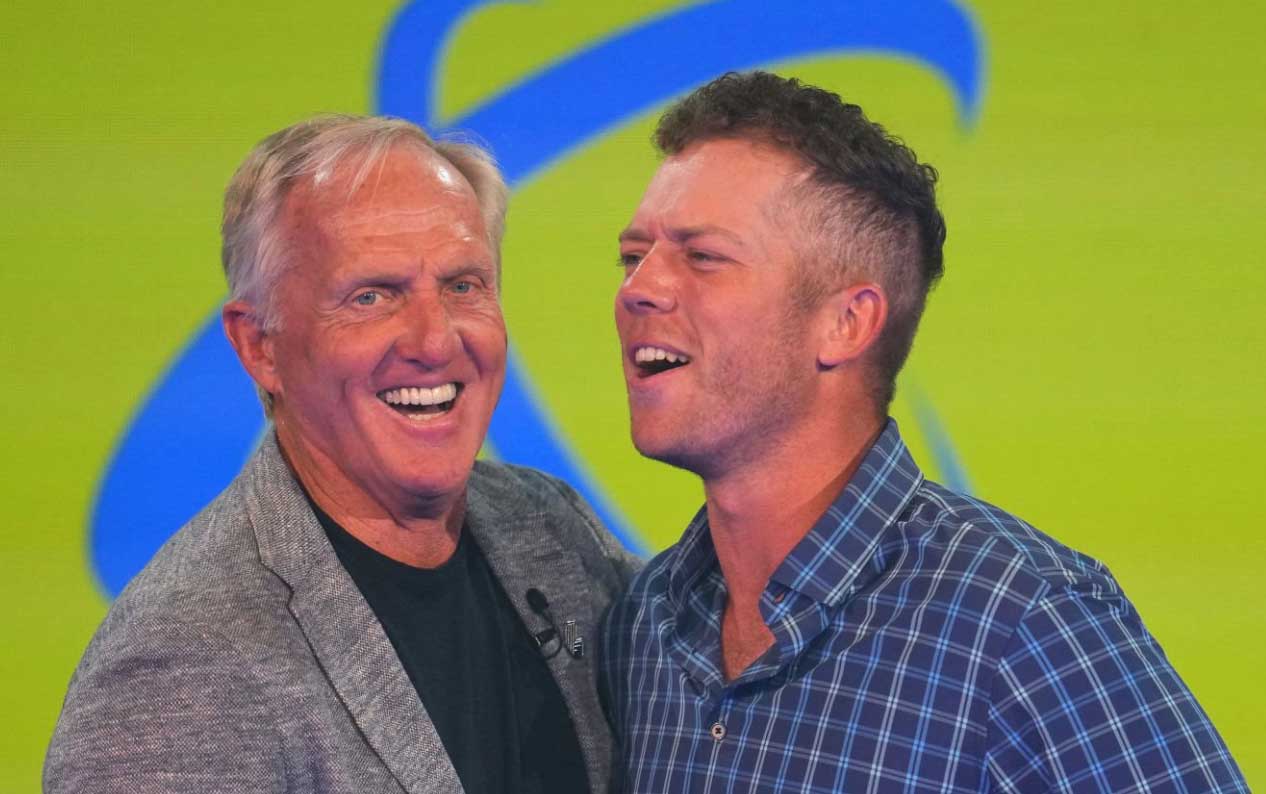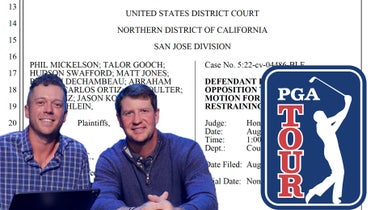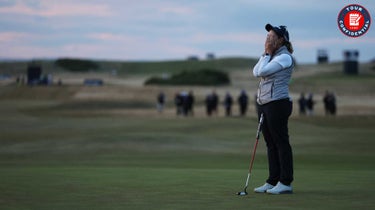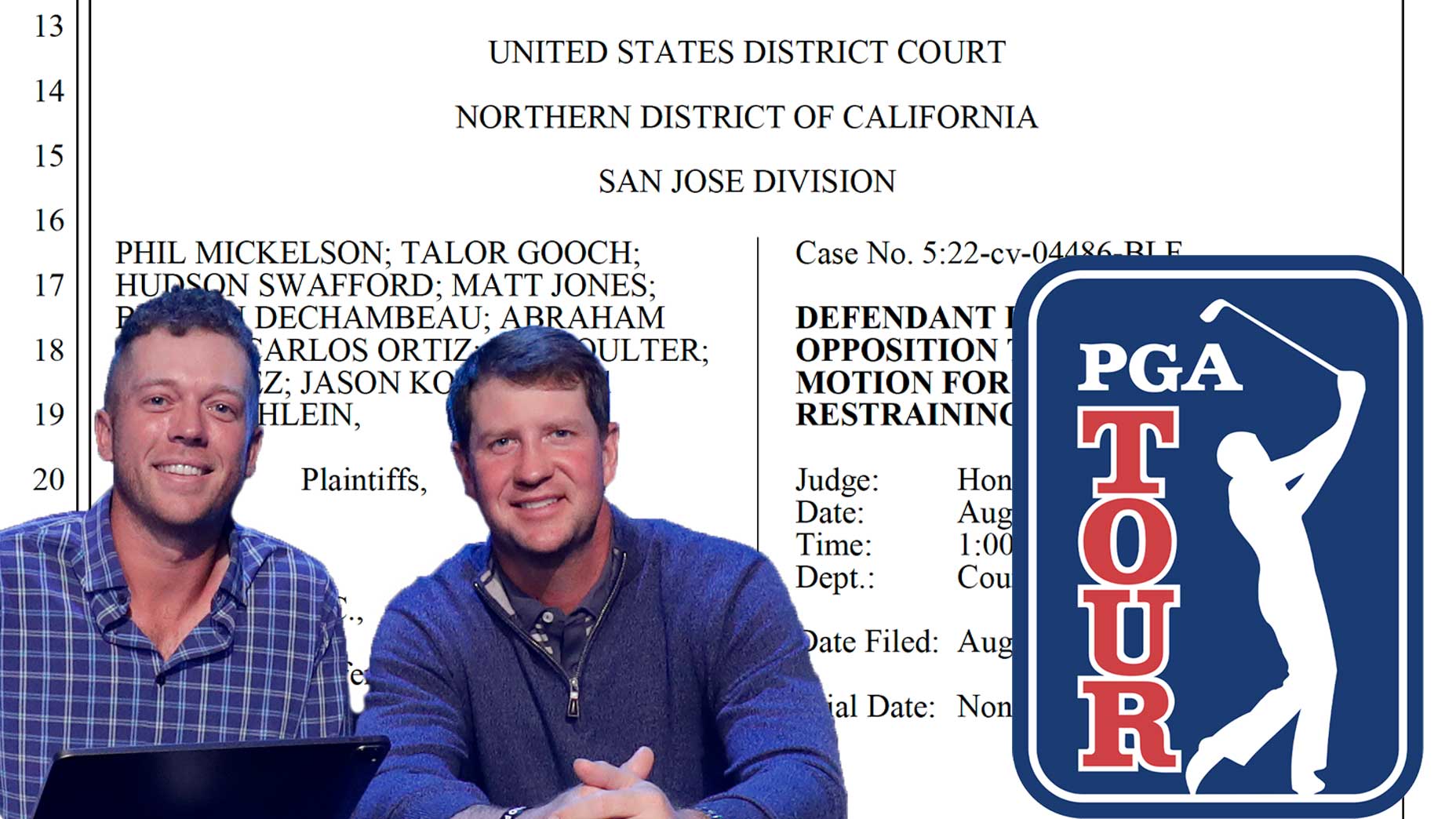
From left: Hudson Swafford, Matt Jones and Talor Gooch.
getty images
Talor Gooch, Matt Jones and Hudson Swafford want to compete in the FedEx Cup Playoffs.
Beth Labson Freeman will decide if they can.
Freeman is a federal judge in Northern California, and at a hearing scheduled for Tuesday afternoon, she will weigh a request from the three players for a temporary restraining order that would allow their participation in the PGA Tour’s season-ending playoff series, which begins this week in Memphis, Tenn.
Gooch, Jones and Swafford all qualified for the playoffs based on FedEx Cup points, but they have since been suspended by the Tour for signing on with competitor LIV Golf.
With their petition for a temporary restraining order, or TRO, the three are asking to have their suspensions lifted.
Gooch, Jones and Swafford are also part of a group of 11 LIV pros who filed suit against PGA Tour last week, alleging that the Tour is acting unlawfully in levying suspensions against golfers who have joined the rival Saudi-backed circuit.
That case has the prospect of dragging on for years.
Gooch, Jones and Swafford are seeking government intervention now, through a petition that amounts to a request for “extraordinary action,” according to Craig Seebald, a partner and antitrust specialist with international law firm Vinson & Elkins.
“Asking a judge to step in and stop something while a case is playing out is not an everyday request,” Seebald says. “For them to seek something like this on day six of a lawsuit is pretty extraordinary.”
For their request to be granted, the plaintiffs will have to meet a robust legal standard, Seebald said. For starters, they will need to show that their case has the likelihood of succeeding on its merits. They will also have to demonstrate that they will suffer “immediate” and “irreparable” injury without relief, and that the harm they stand to endure outweighs any injury a TRO would inflict on the Tour. Lastly, they will have to show that a TRO is in the public interest.
Proving immediate and irreparable harm is a high bar to begin with, Seebald said.

LIV CEO Greg Norman and Talor Gooch before the first LIV event in London.
getty images
“With a TRO, you’re basically saying, ‘the patient is on life support, and if we don’t do something now, something dire is going to happen,’” Seebald said.
Examples of recent federal cases that have triggered TROs have included such front-page headline issues as vaccine mandates in the military and bans on specific immigrant groups.
In general, Seebald said, issues like “immigration, health care and abortion generate TROs. Not rich golfers.”
In the United Kingdom last month, Ian Poulter and two other LIV golfers who’d been suspended by the DP World Tour, had their suspensions lifted by a non-profit appeals board, allowing them to compete in the Genesis Scottish Open. But the legal landscape is different across the pond, and, Seebald said, a judge here “will not care what happened in Scotland.”
Whether the golfers’ larger antitrust suit against the Tour is likely to succeed is another matter, one that the judge would likely rather see resolved over time in the courts, Seebald said.
“I think what’s she likely to say is, ‘It seems like there are reasonable arguments on both sides, so let’s take this to discovery,’” Seebald said. “She’s going to be balancing a number of factors, but I think where she is going to come down is, ‘You’re basically asking me to clear the way for you to play in a couple of more events, and I have a hard time getting involved.’”
Seebald said the judge is also likely to question the timing of the players’ request.
“I can see her saying, you’ve known about these suspensions for a while now, why are you just coming to me now?” Seebald said.
That same point was hammered home by the Tour on Monday in its own court filing responding to last week’s lawsuit. With its request for a TRO, the Tour’s filing read, the plaintiffs “have waited nearly two full months to seek relief from the Court, fabricating an ‘emergency’ they now maintain requires immediate action.”
Also on Monday, LIV Golf CEO Greg Norman issued a statement reiterating LIV’s position that the players, as independent contractors, should have a right to compete where and when they choose.
“I believe all players — whether they choose to play with LIV or the PGA Tour — understand and appreciate the purpose and importance of the players legal actions, across the globe. The PGA Tour is trying to cast this as ‘us’ against ‘them.’ The players know better.”
Norman has said that LIV will support the players in what are almost certain to be protracted court battles. As for the TRO, that matter should be resolved much sooner, according to Josh Davis, a professor at the University of California, Hastings College of Law, and a leading scholar on antitrust procedure. Davis said he expects the judge to issue a decision quickly, either from the bench at the close of the hearing, or shortly after.
Like Seebald, Davis believes the chance of a TRO being granted is slim.
“The general rule is, Any chance? Anything’s possible,” Davis said.
“Realistic chance? Nope.”
Tuesday’s hearing is scheduled for 1 p.m. PT at the U.S. District Court for California’s Northern District, in San Jose. If Gooch, Jones and Swafford hope to be on the course in Memphis this week, they’ll have to beat long odds in the courthouse first.










